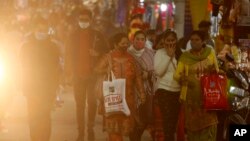Police complaints filed against an Indian comedian for a monologue he gave on the different facets of India, along with the cancelation of a series of shows that were to be given by two other comics have raised concerns about a growing climate of intolerance in India.
Stand-up comedy has become hugely popular in recent years in a country where young, savvy audiences are growing. However, a swelling tide of nationalism has also brought comedians under fire for jokes that poked fun at politicians, appeared to demean the country, or made references to religion or national icons.
The latest uproar was triggered by a six-minute speech given by one of India’s top comedians, Vir Das, in Washington in November at the end of a show.
He said that he came not from one India but two Indias. “I come from an India where we worship women by day and gang rape them at night,” he said.
"I come from an India where we take pride in being vegetarian, and yet run over the farmers who grow our vegetables," went another line referring to the deaths of eight people in October when a car linked to a federal minister allegedly ran over several people during a protest of controversial farm laws.
As the speech went viral on social media, many hit out at him for what they said was vilifying the country while others supported him for the hard-hitting satire.
Two people associated with the ruling Hindu nationalist Bharatiya Janata Party filed police complaints against him – Aditya Jha, a party spokesperson in Delhi, and Ashutosh Dubey, a lawyer who said he is associated with the party. They accused the comedian of making derogatory statements against India and Indian women and maligning India’s image internationally.
Another comedian, Munawar Faruqui, hinted at quitting comedy after his latest show, which was to be given in Bengaluru last Sunday, was canceled after police told organizers it could “disturb public peace and harmony, which may lead to law-and-order problems."
It was the latest of a dozen shows canceled in various cities during the last two months after Hindu right-wing groups threatened the organizers.
“Hate won, an artist has lost,” Faruqui said on Instagram.
Earlier this year, the comedian was jailed for more than a month over a joke about Hindu gods that he had apparently practiced in rehearsal but did not tell onstage.
Saying that the police had “disgraced” themselves by shutting down his shows, The Indian Express newspaper said in an editorial that, “Faruqui and the show’s organizers found they could not depend on what is taken for granted in functional democracies — that the state would defend their right to stage a show against a mob.” The newspaper said that “The political class, irrespective of the party in office, has silently allowed this campaign to grow louder.”
Another comic, Kunal Kamra, said Thursday that his shows in Bengaluru scheduled for later this month had also been canceled, apparently due to threats made to shut down the venue if he performed. The comedian has been critical of the Bharatiya Janata Party and Prime Minister Narendra Modi.
He shrugs aside the cancelations, saying “I don’t see myself as a victim. Whatever experience a comedian goes through, it is all to get a better insight, get a better joke.”
'Outrage culture'
But Kamra said the new climate is causing problems for younger comedians.
“They tell me they have to figure out what kind of comedians they have to become to remain sellable without facing these kind of hurdles,” he said.
In the present atmosphere, he said, some comedians even want to run their jokes past lawyers.
Many blame the targeting of comedians on what they call a growing “outrage culture.”
“This intolerance gets highlighted because of social media, so more people want to add their opinion and validate that outrage. And what happens is that often jokes are taken out of context,” said Balraj Singh Ghai, who runs The Habitat, a venue in Mumbai that has hosted many stand-up comics and other entertainers.
Ghai has experienced the outrage culture firsthand.
In 2017, his venue was targeted by a mob that misunderstood a joke by a stand-up comic that referred to a 17th century king, Shivaji, now seen as a symbol of Hindu identity. In 2020, about a dozen people barged into the venue, again protesting over another stand-up comedian’s reference to the same king.
“They cannot find the artiste so they target the brick-and-mortar venue,” he said.
He is not deterred at hosting more shows saying that “we have to hold ground.”
There is concern, though, that the space for political and social satire is shrinking in the world’s most populous democracy, putting entertainers under pressure.
“Rulers the world over seldom liked jokes targeting them, but we have very humorless people in power,” said author and political analyst Nilanjan Mukhopadhyay.
“They constantly require people to get angry. And stand-up comics have vast reach, so they are targeted,” he said.
Following the backlash that Vir Das’ speech on the different facets of India triggered, he defended his show saying his intention was to remind that India, despite its issues, was "great."
"The video is a satire about the duality of two very separate Indias that do different things. Like any nation, it has light and dark, good and evil within it. None of this is a secret,” he said in a statement.




